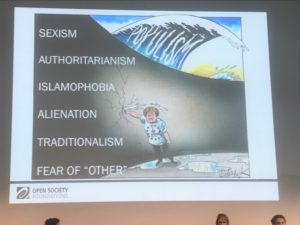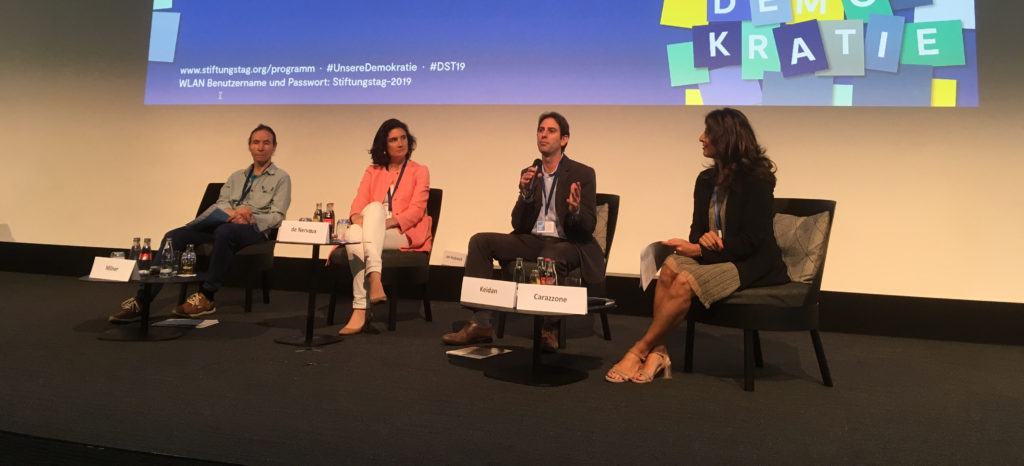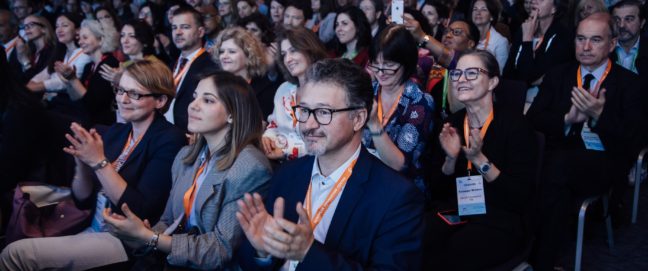As part of Deutscher Stiftungstag 2019 in Mannheim, the Association of German Foundations ran a series of English-language sessions to introduce an international perspective to the country’s foundation sector. The general conference theme of democracy (its title was ‘Unsere Demokratie’ – Our Democracy) naturally resonated throughout the sessions, but others surfaced, too: the Sustainable Development Goals, the need for donors to take more risks and to be less blinkered in their approach and – democracy’s darker shadow – populism. Another theme was implicit in most of the discussion: the way in which the parochialism and conservatism of foundations often undermines their ability to influence the changes they often claim to seek.

“Foundations can play an important role, providing incentives and introducing pluralism and competition in the political process.”
Populism was central to one of the discussions on Wednesday afternoon. Christal Morehouse of Open Society Foundations (OSF) shared findings from a survey OSF had recently conducted. While a majority of Germans ‘consistently’ and unequivocally support democratic ideals and half saw support for immigrants as a ‘moral duty’, also evident were an increasing alienation and a perceived inability to make a difference. Sophia Gaston of the LSE agreed that a nostalgia for the past was fuelling dissatisfaction with the present and noted how populists are capitalising on the tools of democracy, the idea of representation and empowerment. They were also invoking the idea of freedom – freedom from the constraints of ‘socialised liberalism’. How can friends and allies of democracy counter this? The issue for those who were turning to populism, participants agreed, was not so much anxiety over immigration, but the idea of powerlessness. More nuanced responses were therefore needed, with perhaps a focus on ‘managed’ immigration to respond to concerns about loss of control.
More specifically for foundations, in a session on social consensus and democracy organised by the German-American Fullbright Commission, Thomas Konig of the University of Mannheim, noted that foundations can play an important role, providing incentives and introducing pluralism and competition in the political process. It’s critical, he said, that foundations stimulate debate and not homogeneity. A critical issue, he added, is how to bring together technocratic and expert-led government with deliberative and consensual approaches from citizen initiatives.
Failures in Africa
How and why do donors’ African programmes fail to do what they set out to do, wondered Annette Kleinbrod of the Association of German Foundations, chairing a session provocatively titled ‘Our biggest failures in Africa and our lessons learned’.
Sara Link of the CDW Stiftung in Kassel described the work of her foundation in a community in Senegal, M’lomp. CDW was created in 2011 from the proceeds of a global solar technology company and the foundation retains that thrust, with a mission to provide access to renewable energy for remote rural communities. Following installation of a micro-grid to provide electricity in the community, CDW had become further involved in the development of infrastructure and water management facilities and had eventually run into local political complications following the death of the region’s traditional king. He had been a big supporter of the project died and his death had been followed by a power struggle. Deadlock has followed and the project has come to a halt, though negotiations continue. The lessons CDW have drawn from this are that the longer you remain involved in a project, the more you are likely to need to adapt it. You have to be responsive to local need and demand, but you shouldn’t change who the end-beneficiaries will be.
One member of the audience argued that the real failure is the way we still talk and theorise about Africa from outside. ‘Look around,’ he said. ‘There are no Africans in the room.’
The US-based Segal Family Foundation has developed a leadership training model for the social innovation sector, recruiting and training potential leaders, providing technical expertise, networks and access to funding. According to Director of Innovation, Dedo N. Baranshamaje, who joined the session by video link, Segal has grasped the need to fund local organisations to pursue their aims, rather than trusting to external experts. This follows its experience in Burundi at the time of the political crisis in 2015, when most foreign-led organisations left the country. As a result the balance of its funding portfolio, which was around 80 per cent international organisations, to 20 per cent local in 2015 has now radically changed. Trust was at the root of these relationships, he noted. Segal is learning to think about impact in a different way, seeking non-traditional partners and finding different ways of supporting them. What had made this increasing openness on the part of the foundation easier was the founder’s philosophy: ‘if you get the right people, they will figure it out – we’ve adopted that,’ Dedo said.
Thanks to @DedoNB from Segal Family Foundation, Kathrin Hartkopf from @PlanGermany‘s foundation and Sarah Link from CSW Foundation for openly sharing their failures and learnings from some of their International Development projects. Great way to learn from each other! #DST19 pic.twitter.com/F0hkzd6GIi
— Malte Höpfner (@MalteHoepfner) 6 June 2019
‘No project can prosper if it excludes 50 per cent of the world’s population,’ said Kathrin Hartkopf of Plan International (PI). Much larger than the other two organisations featured in the session, PI has a budget of €900 million a year and is active in 72 countries. While its primary focus is on young women and girls, it had begun work in partnership with another organisation on the effects of climate change in one community in Malawi. Droughts and flooding, the consequent loss of crops and the difficulty of earning and planning an income is a challenge for families and especially for women. The project had funded small animal management schemes, savings clubs primarily aimed at women, energy saving and water management schemes and school gardens. To all appearances, it was a success – until they asked a gender expert to evaluate it. She pointed out that, while women had participated in the workshops, it was still the men who made the decisions. The project had not really altered the gender balance in the community. In its next phase, therefore, gender training had been included for both men and women and better results had been achieved. For her, the project had underlined the importance of having a gender element in any project. Following the experience, Plan International now routinely includes gender training in its projects.
Overall, the experiences of the panellists showed that, too often, real partnerships with local organisations are still lacking. One member of the audience argued that the real failure is the way we still talk and theorise about Africa from outside. ‘Look around,’ he said. ‘There are no Africans in the room.’ In the absence of knowledge, we make assumptions about the political and social context. Even when it is not intended, ethnocentricity is difficult to avoid.
Funding at the edge of risk
What is risk for funders and why do they often shy away? Nadia Wernli is the founder of Juma, essentially a platform for young, eclectic Muslims in Germany, eager to contribute to the society they live in. Their actions have included the launch of a game for young people to illustrate how democracy works. While funders like the idea of supporting and engaging young people to contribute, we are Muslims, said Nadia and the current discourse on Muslims in Germany is a deterrent. Funders need to get past that, she said, and focus on the need for young people’s input.
We ask ‘what do you want to learn?’, not ‘what will you achieve?’ We don’t have funding lines, we fund systems change projects which we explore with grantees.
Dr Emelia Roig founded the Centre for Intersectional Justice (CIJ) in 2017 because different forms of discrimination and diversity overlap but are too often treated by civil society as separate. Instead, CIJ looks at the social conditions which create injustice rather than at forms of individual identity. It undertakes advocacy, research and training and has worked, among others, with the Belgian Ministry of Labour on how intersectionality applies to its anti-discriminatory legislation. The challenge for CIJ is that intersectionality doesn’t fit into the portfolios of funders which are organised in terms of individual issues.
Yves Dejaeghere of G1000, an initiative based in Belgium to bring citizens into politics and policy-making, noted that G1000 had been lucky in the early stages because Open Society Foundations (OSF) had funded it when ‘it was only something that might become something’. It is a network, has no official status or structure and, for most funders, that uncertainty makes it risky and therefore hard to fund. ‘You have to say what you’ll achieve in advance’ and in something like citizen engagement in political processes where everything depends on buy-in from the political establishment, that is impossible.
From the funders’ side, two main reasons were cited for avoiding ‘risky’ groups. German foundation law requires that foundations exist in perpetuity, which produces caution. Second, their boards are often comprised of ‘white old men,’ retired politicians or other establishment figures from whom the spirit of innovation had long been absent.
More positively, Romy Krämer of the Guerrilla Foundation, a foundation working with grassroots activists, was exploring a different approach. ‘We ask ‘what do you want to learn?’, not ‘what will you achieve?’’. They adopt a flexible relationship with groups and seek genuine ‘eye-level’ contact. ‘We don’t have funding lines, we fund systems change projects which we explore with grantees.’ Similarly, Andreas Hieronimus of OSF said that his organisation’s approach was to fund organisations, which made it easier for them to see beyond the ‘projectitis’ which often afflicts funders (a complaint which was to recur throughout the sessions) and to take a chance on groups like G1000.
https://twitter.com/DafneHQ/status/1136556134825963520
Still, Nadia Wernli feels that a Catch-22 situation often develops – if you aren’t formally constituted, you can’t get funded, and you can’t set up a structure, because no-one will fund you…Emelia Roig agreed. Seed-funding for informal organisations is critical – and often small amounts are all they need – but big institutional funders can be rigid in their demands. CIJ had started an application for EU funding but had abandoned it because the whole process was ‘too tedious and too time-consuming’.
Next Philanthropy – views from Italy and France
Growth and change were revealed by a 2018 report into the state of global philanthropy, presented at the start of a session hosted by NextPhilanthropy and Alliance magazine. Some particular trends were noted: there is no longer a clear line of demarcation between the for- and non-profit sectors, with players and techniques from the former being increasingly evident in the latter; digital technology will change the way philanthropy and NGOs operate in ways that are not yet apparent; more informal groups and community-based philanthropy organisations are both jostling for position in the philanthropy landscape; and the SDGs and the collaboration they presuppose remain a puzzle for most funders.
A more strategic approach to philanthropy is developing and it is important that it should, it is equally important that it should not become enslaved by the idea of measuring impact and results.
How were these general tendencies playing out in particular countries? Carola Carazzone from Assifero, one of the two Italian foundation networks, said that Italian institutional philanthropy was relatively new, with most foundations having been formed within the last 20 years. Its contribution essentially maintained the status quo. Only a small percentage of foundations funded the core costs of organisations, leaving civil society groups weakened by their dependence on donor project cycles and thus unable to play their full part in shaping society. Assifero does not just represent members, she said, it has a leadership responsibility in encouraging a different model of funding among them and to challenge them to become more professional and to develop their own capacity. She held up as an example the work of the Messina Community Foundation in Sicily which, by stepping outside the project funding model, had played a key role in enabling the development of the social enterprise sector in Italy. She also argued that part of Assifero’s mission is to urge foundations to enter cause areas like human rights, whose establishment was a central plank of a democratic society. The role of foundations, she concluded, should not just be the alleviation of some evident needs.

“There is still ambivalence towards philanthropy in France, highlighted by recent reaction to the Notre Dame fire.” Laurence de Nervaux, Fondation de France (second from left)
Laurence de Nervaux of Fondation de France noted recent growth in France, but from a very low base. Like the Italian foundation sector, that of France is also largely new. She also pointed to recent developments like Giving Tuesday, held for the first time in France last year and the School of Philanthropy supported by the Edmond de Rothschild Foundations which introduces the idea of philanthropy to schoolchildren between the ages of 9 and 12. Despite these and a favourable legal and fiscal environment, there is still ambivalence towards philanthropy in France, highlighted by recent reaction to the Notre Dame fire, she noted.
While social business and social enterprise has made headway, funding is still a challenge, since social enterprises are not tax exempt and are not eligible for grant funding. She also noted that while a more strategic approach to philanthropy is developing and it is important that it should, it is equally important that it should not become enslaved by the idea of measuring impact and results. This led to renewed discussion about the fixation with project funding among funders and their consequent preference for short-term engagement. One audience member observed that venture philanthropy model was a way of getting past that – it provided long-term support and it strengthened organisations. However, de Nervaux pointed out that it, too, could be obsessed with impact. Fondation de France preferred the approach of giving small grants to many organisations in order to strengthen the overall ecosystem of philanthropy. In response to a question about climate change, the panellists agreed that it should not be just foundations with an explicit climate change remit who worked on the issue.
Democracy and the SDGs
Though the word ‘democracy’ is mentioned only once in the text of the SDGs, the idea underlies the whole agenda of the Goals. That was the general conclusion of an afternoon session on the topic. James Magowan of the European Community Foundations Initiative and DAFNE argued that, while the philanthropy sector in Europe as a whole doesn’t always see the SDGs as applying to them, the Goals are a ‘universal call to action’. Moreover, they often provided a common language and framework for foundations’ development work. He also noted that their convening power to stimulate debate and action on the subject, rather than their money, is their biggest asset. Get to know the SDGs and embrace them, he urged. Find out which are relevant to your work and look for opportunities to acting on them. But, he warned, democracy did not just underpin the SDGs, it is also vital for funders themselves to be democratic and accountable. In regard to risk aversion, he cautioned: ‘act now, do more, be prepared to take risks because the biggest risk of all is not acting.’
You can have economic development without democracy, said Augustine Magolowondo, but what kind of development was it? Without political participation, there are no safeguards for economic gains.
Gabriella Benedek of Roots and Wings Foundation in Hungary also spoke of the role community foundations could play in working for the SDGs and promoting democracy. At a time when citizens were switching off from participation in civic affairs, community foundations, with their local presence and their capacity to build trust could help reverse that trend. In essence, argued Augustine Magolowondo of the Democracy Works Foundation in Southern Africa, the SDGs are all about democracy and their fulfilment depends on it. In southern Africa, with its relatively short history of political participation, democracy is a priority, not something to be taken for granted. Energy, water and social inclusion all featured largely in the language of the SDGs. Most countries are signatories to the SDGs and reminding them of the fact can be a non-confrontational way of persuading them to support pro-democracy initiatives. For example, the Democracy Works foundation is organising an ‘integrity run’ in Botswana and is encouraging politicians to sign up for it. When they do, they are reminded that they are committing themselves to the idea of integrity in politics.
News from #DST19
- German foundations edge towards joint action on climate change and gender equality
- German philanthropy award celebrates community foundations
Finally, Klaus Milke of F20, an initiative to promote philanthropic action to address climate change, noted that SDGs came about as a result of a multi-stakeholder consultation, so democracy is not just implicit in the Goals’ achievement, it is also at the heart of the process. ‘We have to make it visible,’ he said.
One person in the audience mentioned that China had taken big strides in development, but was not a democracy. Should development take precedence over democracy, she wondered? The panel’s view was that both needed to happen in tandem. You can have economic development without democracy, said Augustine Magolowondo, but what kind of development was it? Without political participation, there are no safeguards for economic gains.
Use the SDGs as your guide, said James Magowan in the summing up of the session. Think what assets you have – beyond money – and use them. Finally, Gabriella Benedek urged participants to reflect on the moments when you have more power than others and try to act more democratically. It will give you perspective and prevent you from taking politics for granted.
Andrew Milner is associate editor of Alliance magazine
Hosting a conference? Alliance magazine is one of the leading magazines for global philanthropy, and we can provide in-person or remote coverage for your event to over 24,000 readers worldwide. If you would like to explore ways in which Alliance can provide dedicated coverage, please email Amy McGoldrick at amy@alliancemagazine.org.







Comments (1)
I have read about "Failures of Africa " One member of the audience argued that the real failure is the way we still talk and theorise about Africa from outside. ‘Look around,’ he said. ‘There are no Africans in the room.’ I am an African young woman, could you give me a chance to be in that room ? I Let us hope you will overcome your Failures of Africa.